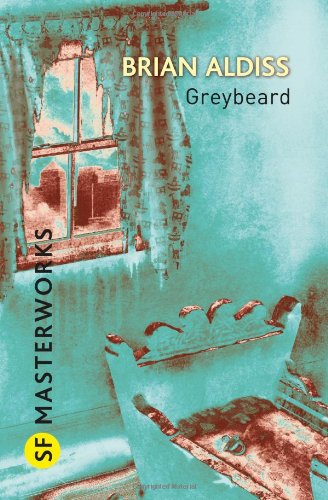Review: Greybeard by Brian Aldiss

The first of my post apocalypse reading, Brian Aldiss' Greybeard is set in a devastated England where nuclear experiments in near space coated the world in radiation and rendered the vast majority of mammalian life sterile. Whilst creatures that nest within the earth have been unaffected, and are prospering in the increasingly wild world the last generation of humanity lives in, anything that lives above ground is in danger of becoming extinct, surprise is expressed by the main characters that they find sheep of all things for instance.
By the time we join the story as readers the damage has been done, society has fragmented into tiny settlements in a world where roads have gone and the next village along the river is viewed with suspicion; horizons shrinking as old age with its terrible burdens sets in. Aldiss doesn't shrink from his vision of the world, the elderly are shown to be just as grasping and tyrannical as the young can be, as delusional and demented. Despite the widely known symptoms of the "Accident" phantom pregnancies are common even amongst women who are too old to have children anyway and the lack of children is constant regret for the protagonists, apart from possibly the title character. At the same time the natural world is shown as bolder, more troublesome, as man's grip slips threats emerge; much significance is given over to the danger of packs of stoats, which sounds laughable until you remember that as a man in his mid fifties Greybeard is considered young, and the image of an octogenarian trying to fend off a horde of animal is one that only stirs fear and pity.
The main plot details Greybeard, Martha, his wife, and a few other people, most of them men, setting off on a lunatic quest to boat down the Thames, partly to escape the terrible place the village, Sparcot, has become and partly because they have a desire to see what the conditions are like elsewhere. This journey is interlocked with flashbacks to events that detail many of the characters lives at points before they arrive at Sparcot and its here that we see most of the effort Aldiss has put into the shaping his world and characters, though most of the character development focuses on Greybeard and Martha.
He unflinchingly details what happens to society, the transition from gentle decline to more vigorously trying to destroy itself through war and authoritarianism; whilst being helped along by disease, especially cholera. The idea of cholera ravaging through somewhere as genteel as Oxford is somehow quite terrifying. The effect of there being no children on businesses and the economy is a repeated point, Greybeard's father ran a soft toy manufacturers and dies in a car accident soon after learning that the markets collapsed because there were no children, whilst in another flashback we learn that another character's father jumps out of a high window because there are no teenagers to buy his company's records. No children means no one to sell products to, which means the economy falters, the whole world falling apart in a cascade of dominoes.
The flashbacks detail the efforts made to try and secure a future for the species and to record society's final days, in a gesture that seems at once altruistic and narcissistic. Greybeard ends up working for the amusingly acronymed DOUCH(E), which I assume didn't have the meaning as an insult it does today back in 1964, the organisation that attempts to do this recording work and we see how it affects him; which is to say, badly. Greybeard after the collapse of society seems a happier, more collected figure than he does during the last days of so called civilisation, as do many of the other characters.
Aldiss' use of language is beautiful in places, there are references to 'hollow cheeked street's and a 'beggarly greedy graveyard' in the early stages of the book and other parts of the language caught my eye as I read through. My only complaint about the book is that despite the collapse of society, the lack of children and therefore the destruction of their traditional role, the women don't seem to actually do anything beyond occupy the position of traditional wives, but I put this down to the time the book was written rather than anything else.
Comments
Post a Comment